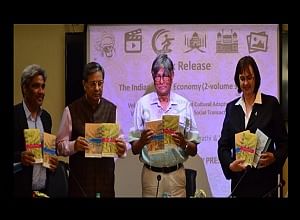
jmi
“An institutional need to incorporate culture with development” was highlighted today by Chairman, University Grants Commission, D P Singh, at valedictory function of the two-day national consultation programme on “Mapping Creative Industry and Economy in India” organised by Jamia Millia Islamia’s Centre for Culture, Media and Governance (CCMG).
Former Vice Chancellor of three universities including Banaras Hindu University and former Director of National Assessment and Accreditation Council (NAAC) said that in the Indian context there was a clear rationale to frame cultural and creative economy as a tool for livelihood protection and sustainable development.
Singh, said that as the creative economy has been growing more rapidly than the overall economy along with employing high skill and high wage workers, there was “a need to reorient our policy and institutions both at the State and the Centre and recognise that sector specific and spatially differentiated policy strategy needs to be articulated.”
Her Excellency Joanna Kempkers, New Zealand’s High Commissioner to India who was the Guest of Honour on the occasion spoke about the cultural activities and exchanges between the two countries. She said that as many as 130 Bollywood films were shot in New Zealand.
She said that New Zealand is also known for its well developed post-production industry as well as the gaming industry. The country is home to 145 game design companies.
6 out of 10 most downloaded games on mobile apps have been made in New Zealand, she added making clear that the opportunities for collaboration between the two countries in creative industry.
Talat Ahmad, Vice Chancellor, JMI who chaired the session said that the creative and cultural map of India needs to be explored beyond Agra and Jaipur and that the social media can prove to be a powerful tool to leverage it.
He hoped that the outcome of two-day deliberations would emerge in the form of major policy recommendation to the Government.
Das, Director, CCMG who delivered the vote of thanks said that the consultation has been enriched with a diverse representation from the industry experts, scholars from both India and New Zealand, faculty members and students.
Padma Bhushan Shri Rajeev Sethi, Chairperson, Asian Heritage Foundation and Padma Shri Sanjay Govind Dhande, Former Director, IIT-Kanpur also spoke at the national consultation which was attended by the Pro Vice-Chancellor JMI Shahid Ashraf and Registrar, A P Siddiqui, Deans, Directors and Heads of Departments.
The importance of an idea as a product as essential and core to the concept of creative industry, Intellectual property rights, commonalities in the skill sets in creative industry as a whole, need for specialised talent pool in creative industry and an Indian way of engaging with Creative Industry were some major outcomes of the national consultation.
A double-volume edited work, The Indian Media Economy, edited by Adrian Athique, Vibodh Parthasarathi and SV Srinivas published by Oxford University Press was released at the function.
The volumes are a result of collaboration between scholars based at University of Waikato, New Zealand and Jamia Millia Islamia under the aegis of India New Zealand Education Council (INZEC) Research Grants programme.









